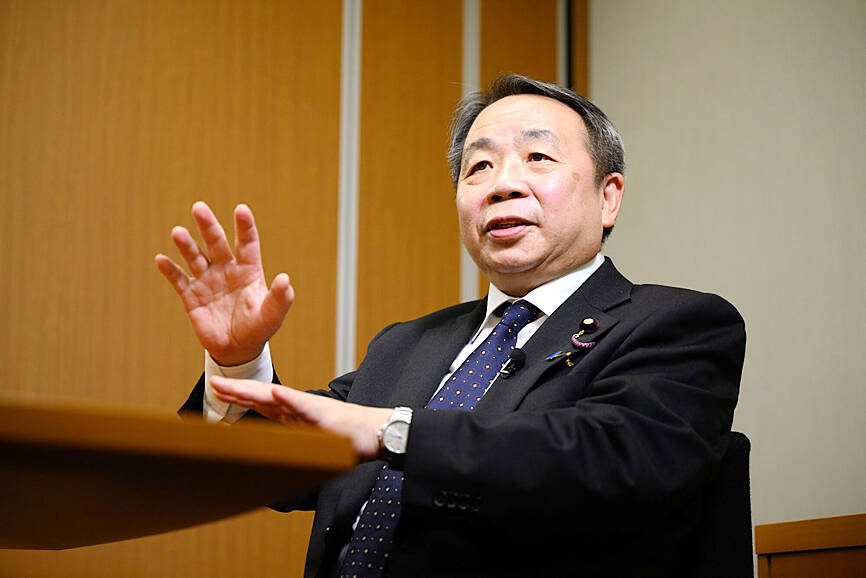Japan should leverage its alliance with the US to counter China’s threats rather than seeking quick compromises alone that will lead to long-term losses, said a Japanese lawmaker whose entry into China has been banned.
If Beijing signals wielding rare earths restrictions as a weapon, Tokyo should hint that it could join forces with Washington to curb China’s access to semiconductor-making devices over which Japan retains supremacy, Japan Innovation Party lawmaker Hei Seki said on Thursday.
Seki said he sees chances for China to use that card like it did more than a decade ago against Japan, as the two nations verbally spar over Japanese Prime Minister Sanae Takaichi’s recent remarks on Taiwan.

Photo:Bloomberg
Many nations now see Beijing’s dominance over the critical minerals as problematic and a full-scale trade war with Japan would worsen China’s economic standing given its fragile trade truce with Washington.
“Japan is smaller in size than China and militarily, they might be superior. But Japan has an advantage China lacks,” Seki said. “Japan has allies. The Japan-US alliance is for a situation like this.”
Chipmaking devices accounted for about 12 percent of Japan’s exports to China last year, the second-biggest market after the US, Japanese government data showed.
Washington has been asking Tokyo to join forces to cripple Beijing’s ability to make advanced semiconductors, which are critical for economic security and defense capabilities.
Takaichi must not retract her remarks as requested by China, Seki said, adding that the remarks made it clearer to China that Japan is ready to help the US preserve Taiwan’s independence.
“When it comes to a Taiwan contingency, I believe it’s actually good that Japan’s prime minister made somewhat bold statements,” he said. “This serves as a form of deterrence against [Chinese President] Xi Jinping [習近平] and China.”
While China’s rhetoric shows no sign of easing, actual actions it has taken so far fall short of hard brakes on its economic activities with Japan, Seki said, pointing to China giving a travel warning, instead of a complete ban.
It also knows the limits to what it can do against Japanese companies in China, he said.
“What would happen to Japan if China expelled all Japanese companies out of China?” Seki said. “Japanese companies would suffer losses, but the Chinese government couldn’t possibly do that. Why? Because those Japanese companies employ a large number of Chinese people.”
There is no need for Japan to seek compromises in a rush, as China would eventually find a timing to tone down threats, he added.
“Having studied the Chinese Communist Party regime for many years, I understand their habits well,” he said. “They always become arrogant and adopt an intimidating attitude toward those who yield or appear weak. Conversely, they treat strong opponents with politeness. That’s China.”
Japan should not overreact to every single rhetoric from Beijing, but it should consider expelling Chinese Consul General in Osaka Xue Jian (薛劍), Seki said, referring to Xue earlier this month threatening to cut off Takaichi’s head in a now-deleted post on X.

CHARGES: The former president, who maintains his innocence, was sentenced to 27 years and three months in prison for a failed coup bid, as well as an assassination plot Far-right former Brazilian president Jair Bolsonaro is running out of options to avoid prison, after judges on Friday rejected his appeal against a 27-year sentence for a botched coup bid. Bolsonaro lost the 2022 elections and was convicted in September for his efforts to prevent Brazlian President Luiz Inacio Lula da Silva from taking power after the polls. Prosecutors said the scheme — which included plans to assassinate Lula and a top Brazilian Supreme Court judge — failed only due to a lack of support from military top brass. A panel of Supreme Court judges weighing Bolsonaro’s appeal all voted to uphold

The latest batch from convicted sex offender Jeffrey Epstein’s e-mails illustrates the extraordinary scope of his contacts with powerful people, ranging from a top Trump adviser to Britain’s ex-prince Andrew. The US House of Representatives is expected to vote this week on trying to force release of evidence gathered on Epstein by law enforcement over the years — including the identities of the men suspected of participating in his alleged sex trafficking ring. However, a slew of e-mails released this week have already opened new windows to the extent of Epstein’s network. These include multiple references to US President Donald

Chinese tech giant Alibaba yesterday denied it helps Beijing target the US, saying that a recent news report was “completely false.” The Financial Times yesterday reported that Alibaba “provides tech support for Chinese military ‘operations’ against [US] targets,” a White House memo provided to the newspaper showed. Alibaba hands customer data, including “IP addresses, WiFi information and payment records,” to Chinese authorities and the Chinese People’s Liberation Army, the report cited the memo as saying. The Financial Times said it could not independently verify the claims, adding that the White House believes the actions threaten US security. An Alibaba Group spokesperson said “the assertions

LEFT AND RIGHT: Battling anti-incumbent, anticommunist sentiment, Jeanette Jara had a precarious lead over far-right Jose Antonio Kast as they look to the Dec. 14 run Leftist candidate Jeannette Jara and far-right leader Jose Antonio Kast are to go head-to-head in Chile’s presidential runoff after topping Sunday’s first round of voting in an election dominated by fears of violent crime. With 99 percent of the results counted, Jara, a 51-year-old communist running on behalf of an eight-party coalition, won 26.85 percent, compared with 23.93 percent for Kast, the Servel electoral service said. The election was dominated by deep concern over a surge in murders, kidnappings and extortion widely blamed on foreign crime gangs. Kast, 59, has vowed to build walls, fences and trenches along Chile’s border with Bolivia to